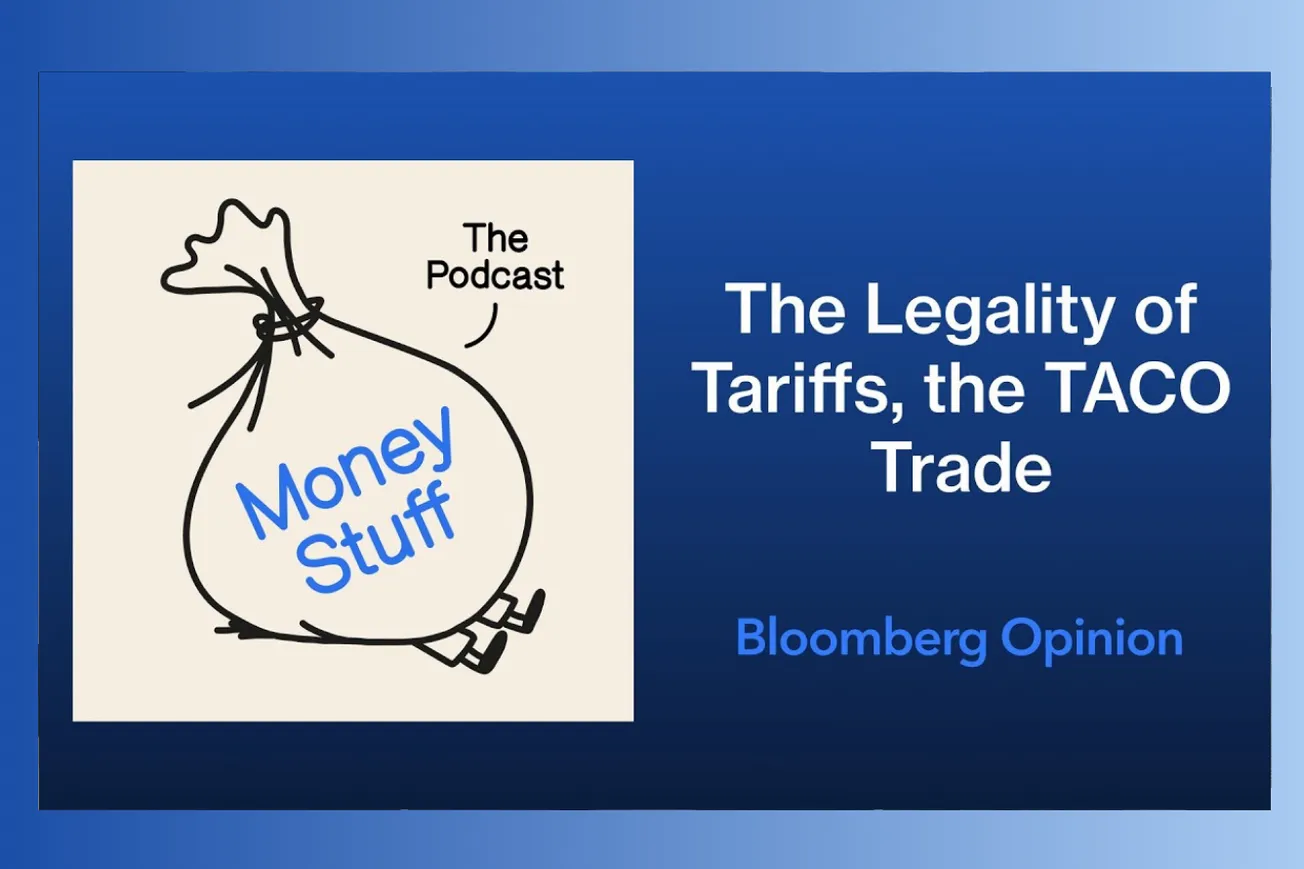Table of Contents
Federal trade court strikes down Trump's universal tariffs as unconstitutional while Bitcoin treasury companies proliferate and government-sponsored enterprises face renewed privatization pressure under new administration.
Bloomberg's Money Stuff podcast analyzes how constitutional limitations on executive tariff power create market volatility, while speculative Bitcoin strategies transform penny stocks into multi-billion dollar vehicles and mortgage giants await restructuring.
Key Takeaways
- US Court of International Trade blocked Trump's universal "Liberation Day" tariffs as unconstitutional violation of congressional authority over trade policy
- Constitutional separation of powers requires Congress, not president, to impose tariffs, though specific emergency laws provide limited executive exceptions
- "Taco trade" strategy of betting against Trump tariff permanence faces uncertainty as legal challenges create unpredictable enforcement landscape
- Fannie Mae and Freddie Mac privatization discussions intensify with Trump administration backing implicit government guarantees during transition process
- Existing GSE shareholders who bought "worthless" stock during conservatorship could receive hundreds of billions in value depending on privatization structure
- Bitcoin treasury company trend reaches speculative peak as any public company can double asset values by purchasing cryptocurrency holdings
- Micro Strategy's success spawned imitators including $2 million companies becoming $2 billion entities overnight through Ethereum purchases rather than operations
- S&P 500 now contains significant cryptocurrency exposure through Coinbase inclusion and Bitcoin treasury strategies of constituent companies
Timeline Overview
- 00:00–08:30 — Personal Updates and Tariff Breaking News: Katie's European starling care routine, US Court of International Trade ruling blocking Trump's universal tariffs, appeals process uncertainty
- 08:30–22:45 — Constitutional Tariff Analysis and Market Impact: Non-delegation doctrine implications, congressional versus executive trade authority, "taco trade" strategy effectiveness amid legal challenges
- 22:45–38:20 — Fannie Mae Freddie Mac Privatization Strategy: Government-sponsored enterprises implicit guarantee preservation, shareholder value scenarios, mortgage rate implications for housing market
- 38:20–52:15 — Bitcoin Treasury Company Proliferation: Micro Strategy copycat strategies, Sharp Link Gaming transformation from $2M to $2.4B through Ethereum acquisition
- 52:15–65:40 — Speculative Peak Analysis and Market Structure: GameStop and Trump Media bitcoin purchases, S&P 500 cryptocurrency exposure, global financial asset portfolio theory
Constitutional Crisis in Trade Policy: Courts Strike Down Executive Overreach
The US Court of International Trade delivered a significant constitutional ruling by blocking Trump's universal tariffs, establishing important precedents for executive versus congressional authority over international trade policy and creating immediate market volatility.
- Liberation Day tariffs imposing 10-150% rates on all imports violated constitutional separation of powers by usurping congressional authority to regulate interstate and international commerce
- International Emergency Economic Powers Act (IEEPA) cannot justify universal trade restrictions because decades of routine trade deficits do not constitute ongoing national emergencies
- Non-delegation doctrine prevents Congress from granting unlimited tariff authority to presidents without specific constraints, factfinding requirements, and time limitations
- Appeals to Federal Circuit Court and likely Supreme Court review will determine final scope of executive trade powers and constitutional enforcement mechanisms
- Alternative tariff laws like Section 232 require months-long investigations and specific national security justifications rather than broad economic deficit concerns
- Market volatility reflects uncertainty about rule of law enforcement and whether constitutional constraints will effectively limit presidential trade policy discretion
Matt Levine notes the irony that many government officials may not have read the Constitution despite swearing oaths to defend it, while the document clearly states Congress controls tariff policy rather than executive branches.
The "Taco Trade" Strategy Faces Legal Uncertainty
Financial markets developed sophisticated betting strategies around Trump's pattern of announcing dramatic tariffs followed by negotiations that reduce actual implementation, but constitutional challenges create new variables in predicting policy outcomes.
- "Taco trade" coined by FT's Rob Armstrong reflects consistent pattern where Trump announces extreme tariffs then accepts lesser negotiated settlements through diplomatic pressure
- Takito variant (Trump Always Quickly Undoes Initial Trade Offensive) describes more specific mechanism of initial announcement followed by rapid modification based on market reactions
- Trump's anger about "always chickens out" characterization may reduce effectiveness of strategy by creating political pressure to follow through on extreme positions
- Court supervision of tariff authority paradoxically might improve US negotiating position by providing legal framework and predictability for international trade partners
- Foreign negotiators face tactical decision between rushing to make deals during legal uncertainty versus waiting to see final scope of presidential tariff authority
- Market participants must now account for both political negotiation patterns and constitutional law enforcement when pricing tariff announcement impacts
The strategy's effectiveness depends on whether constitutional constraints create more predictable negotiation frameworks or simply add another layer of uncertainty to already volatile trade relationships.
Fannie Mae and Freddie Mac: The Hundred Billion Dollar Privatization Question
Trump's Truth Social post supporting GSE privatization while maintaining government guarantees revives complex restructuring discussions with enormous financial stakes for existing shareholders and housing market implications.
- Current conservatorship structure since 2008 financial crisis requires all GSE profits flow to government while shareholders receive nothing under 2012 agreement modifications
- Existing shareholders who purchased "worthless" stock during conservatorship crisis could receive zero value or hundreds of billions depending on privatization structure chosen
- Two extreme scenarios include either raising $340 billion new capital to dilute existing shareholders to near-zero or canceling government debt to benefit current investors massively
- Implicit government guarantee provides cheapest mortgage financing for consumers but creates moral hazard and taxpayer risk during future financial crises
- Privatization could increase mortgage rate dispersion by enabling risk-based pricing rather than current uniform conforming loan rates across creditworthiness levels
- Political optics of providing hundred billion dollar windfall to sophisticated investors who bought distressed securities creates significant implementation challenges
FHFA oversight emphasizes maintaining housing market stability and avoiding mortgage rate increases during any transition process, though specific mechanisms remain undefined.
Bitcoin Treasury Mania: Peak Speculation in Corporate Cryptocurrency
The trend of stuffing public companies with cryptocurrency holdings reached speculative extremes as any entity can apparently double asset values by purchasing Bitcoin or Ethereum rather than operating traditional businesses.
- Sharp Link Gaming exemplifies pure speculation by transforming from $2 million sports betting marketing company to $2.4 billion market cap through $425 million Ethereum acquisition
- Proforma market capitalizations create misleading valuations where retail investors pay premiums for cryptocurrency exposure without understanding share dilution from incoming investments
- GameStop and Trump Media bitcoin purchases both resulted in stock price declines, suggesting possible peak speculative behavior and trade exhaustion among meme stock participants
- Micro Strategy's original success as legitimate software company with gradual bitcoin accumulation has spawned pure financial engineering copycat strategies without operational businesses
- S&P 500 index funds now provide indirect cryptocurrency exposure through Coinbase inclusion and bitcoin treasury strategies of constituent companies like Micro Strategy
- Global financial asset portfolio theory suggests index fund investors should naturally hold cryptocurrency exposure proportional to market capitalization rather than avoiding entirely
The proliferation from serious corporate treasury strategies to obvious speculation vehicles suggests the bitcoin treasury trend may be approaching natural limits as market participants become more skeptical.
Market Structure Evolution: Cryptocurrency Integration into Traditional Finance
The integration of cryptocurrency assets into mainstream financial markets through index inclusion and corporate treasury strategies represents significant structural changes in asset allocation and investor exposure patterns.
- Index fund investors automatically gain cryptocurrency exposure through S&P 500 holdings without explicit investment decisions, creating passive demand for bitcoin-adjacent securities
- Corporate bitcoin treasury strategies enable indirect cryptocurrency investment for institutions restricted from direct digital asset purchases by investment mandates or regulatory constraints
- Micro Strategy's evolution from software company to bitcoin investment vehicle demonstrates how traditional corporate structures can be repurposed for cryptocurrency speculation
- Market cap weighted portfolio theory suggests optimal diversification includes proportional cryptocurrency exposure reflecting global financial asset distribution rather than zero allocation
- Journalistic ethics considerations around cryptocurrency ownership become complicated when index fund investments provide indirect exposure through traditional investment vehicles
- Speculation premium attached to bitcoin treasury companies over direct cryptocurrency ownership reflects structural market inefficiencies and limited institutional access channels
The trend indicates cryptocurrency asset class maturation through integration with traditional financial market structures rather than remaining parallel alternative investment ecosystem.
Common Questions
Q: Why can't the president impose tariffs if Congress passed laws allowing it?
A: Congressional tariff authority cannot be delegated without limits; specific laws require investigations, time constraints, and factual findings rather than unlimited executive discretion over trade policy.
Q: What determines whether Fannie Mae and Freddie Mac shareholders get massive windfalls or nothing?
A: Privatization structure could either require new capital raising that dilutes existing shareholders or government debt forgiveness that creates hundreds of billions in shareholder value.
Q: Why do companies become worth more by buying Bitcoin than the Bitcoin itself costs?
A: Market inefficiencies, restricted institutional access to direct cryptocurrency purchases, and speculation premiums create temporary arbitrage opportunities for bitcoin treasury strategies.
Q: How does the "taco trade" strategy work in practice?
A: Investors bet that Trump's extreme tariff announcements will be moderated through negotiations, but constitutional challenges add legal uncertainty to traditional political prediction models.
Q: What happens to mortgage rates if Fannie Mae and Freddie Mac are privatized?
A: Depends on structure chosen - explicit government guarantees with fees could raise rates, while implicit guarantees might maintain current pricing but create taxpayer risks.
The discussions reveal how constitutional law, financial engineering, and market speculation intersect to create complex policy and investment challenges. Trump administration policies face judicial constraints that may limit executive authority while creating new forms of market uncertainty. Cryptocurrency integration into traditional finance accelerates through corporate treasury strategies even as speculative excess suggests possible trend maturation. Housing finance reform remains politically and technically challenging due to enormous financial stakes and consumer impact concerns.
Practical Implications
- Constitutional trade authority limits executive tariff power — Court rulings establish precedents requiring congressional approval for broad trade restrictions, though specific emergency laws provide limited presidential discretion
- GSE privatization creates massive investor opportunities and risks — Existing shareholders face binary outcomes between total loss and hundred billion dollar windfalls depending on political decisions about debt forgiveness
- Bitcoin treasury strategies may have peaked speculatively — Corporate cryptocurrency purchases increasingly appear as financial engineering rather than legitimate business strategies, suggesting natural market maturation limits
- Index fund cryptocurrency exposure grows automatically — Mainstream investors gain digital asset exposure through S&P 500 holdings without explicit investment decisions as companies adopt bitcoin treasury strategies
- Market structure changes require portfolio theory updates — Global asset allocation models should incorporate cryptocurrency proportional to market capitalization rather than maintaining zero exposure through traditional investment vehicles
- Housing finance reform affects mortgage accessibility — Privatization structure determines whether mortgage rates remain uniform or become more risk-adjusted, potentially affecting affordability for different creditworthiness levels
- Legal uncertainty creates new trading strategy variables — Constitutional challenges to executive authority add judicial review timelines to traditional political prediction models for policy-sensitive investments
- Financial engineering arbitrage opportunities may diminish — As bitcoin treasury company proliferation reaches speculative peaks, premium valuations over direct cryptocurrency ownership likely face correction pressures
The intersection of constitutional law, financial innovation, and speculative markets demonstrates how traditional regulatory frameworks struggle to address rapidly evolving investment strategies and executive power boundaries in modern financial systems.





